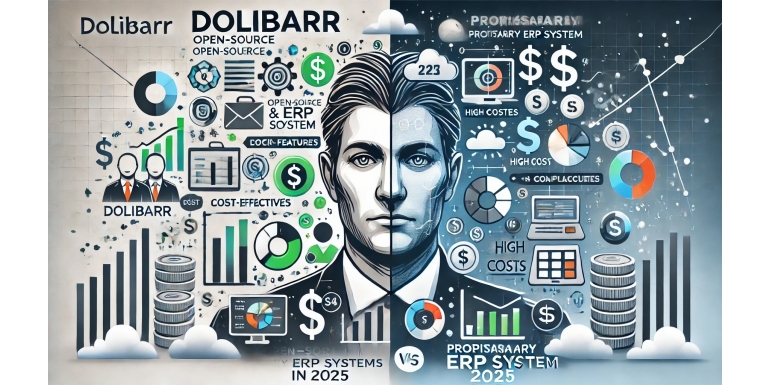
Enterprise Resource Planning (ERP) systems have become the backbone of modern business operations. From streamlining workflows to managing finances and inventory, they hold the key to a company’s efficiency and growth. For many entrepreneurs and IT professionals, the question often arises when choosing between an open-source solution like Dolibarr or a proprietary ERP system.
With 2025 just around the corner, businesses are rethinking their strategies, particularly with the rise of digital transformation and the increasing demand for cost-efficient and scalable solutions. This blog provides an in-depth analysis of the costs, advantages, and considerations of Dolibarr and proprietary ERP systems to help you make an informed decision for your business.
What is Dolibarr?
Dolibarr is an open-source ERP and CRM software designed for small to medium-sized businesses (SMBs). Launched in 2003, it has gained popularity among entrepreneurs for its simplicity, flexibility, and affordability. Dolibarr is built to support a wide range of functionalities, including customer relationship management, financial tracking, inventory management, project management, and more—all through a modular approach that allows users to integrate features as needed.
Features
- Modular Architecture: Add or remove features such as accounting, HR, or sales modules based on your business requirements.
- Multi-Platform Accessibility: Access Dolibarr from desktops, mobile phones, or even the cloud.
- Ease of Use: Its intuitive design makes it accessible to businesses without requiring extensive technical expertise.
- Scalability: Suitable for startups scaling into mid-sized enterprises over time.
Target Audience
Dolibarr is ideal for:
- Small and medium-sized businesses looking for cost-effective solutions.
- Entrepreneurs or startups with evolving ERP needs.
- IT professionals seeking open-source and highly customizable software.
Its popular use cases include retail, manufacturing, consulting firms, and nonprofits.
Advantages of Choosing Dolibarr
Choosing Dolibarr over proprietary ERP systems offers several advantages, especially for resource-conscious businesses seeking efficient and flexible solutions.
1. Cost-Effectiveness
Dolibarr stands out as a cost-efficient ERP solution since there are no licensing fees. The open-source nature of the platform ensures that you only invest in setup, customizations, and maintenance, which are typically lower than the costs associated with proprietary ERP systems.
Proprietary ERPs, meanwhile, often come with hefty upfront costs, licensing renewal fees, and mandatory updates—making Dolibarr a clear winner for startups and SMBs with limited budgets.
2. Customizability and Scalability
Dolibarr’s modular architecture allows businesses to adopt and scale features at their own pace. Start small with basic functionalities like invoicing and CRM, and seamlessly add modules as your business grows. Proprietary systems often come with predefined packages, leaving little room for personalization without incurring additional costs.
3. Community Support and Open-Source Benefits
The open-source community backing Dolibarr is a treasure trove of resources and support. Forums, online guides, and user contributions ensure rapid troubleshooting and continuous feature evolution. Proprietary solutions rely heavily on vendor support, which often comes at an additional cost and lacks the flexibility of community-driven innovations.
4. Transparency and Data Control
With Dolibarr, your business retains full control over its data. Many proprietary ERPs store your data on vendor-controlled servers, raising potential concerns about accessibility and security, especially for privacy-conscious industries.
Key Considerations When Choosing an ERP for 2025
Choosing the right ERP is pivotal to future-proofing your business. Here are essential factors to consider when selecting Dolibarr or a proprietary system:
1. Integration Capabilities
Your ERP should seamlessly integrate with other business tools, like accounting software or eCommerce platforms. Dolibarr supports a wide range of APIs and integrations, often offering flexibility that proprietary systems might lack.
2. User-Friendliness
While Dolibarr is designed with simplicity in mind, proprietary ERPs often deliver more polished and cohesive user experiences. However, open-source platforms like Dolibarr offer customization options to enhance usability for specific workflows.
3. Employee Training Needs
Consider the training investment required to onboard employees. Dolibarr’s intuitive interface and extensive documentation mean less time spent learning, whereas proprietary solutions often require vendor-led training.
4. Future-Proofing
Proprietary vendors may retire products, leaving customers to migrate—a time-consuming and costly process. With Dolibarr’s open-source community, updates and improvements are ongoing, safeguarding its longevity.
Cost Analysis: Dolibarr vs Proprietary ERPs
Understanding the financial implications of both options is key to making the right choice.
Upfront and Maintenance Costs
- Dolibarr:
- Free software with optional costs for hosting, customization, and support.
- Low annual maintenance and no licensing fees.
- Proprietary ERPs:
- Expensive licensing or subscription-based fees.
- Higher setup costs due to vendor involvement.
Long-Term Savings
Dolibarr’s lack of recurring licensing fees equates to significant long-term savings. Combine this with its scalability, and you're looking at a solution that adapts to your growth without hefty reinvestments.
Return on Investment (ROI)
Businesses using Dolibarr often report a faster ROI due to the low initial investment and high adaptability. Proprietary ERPs may provide quicker time-to-value in some cases but at a higher cost burden.
Real-Life Success Stories with Dolibarr
Nothing speaks louder than real-world success. Here are a few examples of businesses thriving with Dolibarr:
- Tech Startups:
A tech startup using Dolibarr’s project management tools reportedly cut administrative overhead by 40%, enabling faster product launches.
- Retail Chains:
A chain of boutique stores automated its invoicing process with Dolibarr’s finance modules, saving weeks of manual paperwork.
- Nonprofits:
A nonprofit organization streamlined its donor management using Dolibarr’s CRM and reporting modules, ensuring clearer communication and better funding outcomes.
These success stories emphasize Dolibarr’s adaptability to various industries and business sizes.
Why Dolibarr is a Competitive Choice for 2025
Dolibarr’s cost-effectiveness, modular flexibility, and active community support make it a standout ERP solution for scaling businesses. Its open-source nature future-proofs organizations against the limits and high costs often associated with proprietary ERP systems.
If you're considering your business management needs for 2025, Dolibarr presents an opportunity to integrate powerful, affordable, and adaptable tools into your operations.
